| Srl | Item |
| 1 |
ID:
174130
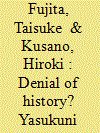

|
|
|
|
|
| Summary/Abstract |
Under what conditions would Japanese leaders visit the controversial Yasukuni Shrine and why? Previous studies have focused primarily on the domestic benefits and effects of such visits, claiming that leaders employ visits to follow their own conservative ideology and gain domestic political support. Given the harsh international criticism that tends to ensue, however, political leaders should also consider the cost and international effects of such visits. This study proposes three necessary conditions for such visits: a conservative ruling party, a government enjoying high popularity, and Japan's perception of a Chinese threat. With regard to the latter, a security threat from China has allowed Japan to use these visits as a credible signal of its resolve against China. Comparative analyses of Japanese cabinets after the mid-1980s support this argument.
|
|
|
|
|
|
|
|
|
|
|
|
|
|
|
|
| 2 |
ID:
098662
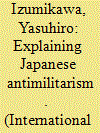

|
|
|
|
|
| Publication |
2010.
|
| Summary/Abstract |
Since the late 1990s, Japan has sent increasing numbers of its military forces overseas. It has also assumed a more active military role in the U.S.-Japan alliance. Neither conventional constructivist nor realist approaches in international relations theory can adequately explain these changes or, more generally, changes in Japan's security policy since the end of World War II. Instead, Japan's postwar security policy has been driven by the country's powerful antimilitarism, which reflects the following normative and realist factors: pacifism, antitraditionalism, and fear of entrapment. An understanding of the influence of these three factors makes it possible to explain both Japan's past reluctance to play a military role overseas and its increasing activism over the last decade. Four case studies-the revision of the U.S.-Japan Security Treaty in 1960, the anti-Vietnam War period, increases in U.S.-Japan military cooperation during détente, and actions taken during the administration of Junichiro Koizumi to enhance Japan's security profile-illustrate the role of antimilitarism in Japan's security policy. Only through a theoretical approach based on analytical eclecticism-a research strategy that considers factors from different paradigms-can scholars explain specific puzzles in international politics.
|
|
|
|
|
|
|
|
|
|
|
|
|
|
|
|
| 3 |
ID:
142978
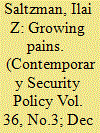

|
|
|
|
|
| Summary/Abstract |
The rise of China has attracted considerable scholarly attention since the early 1990s. Recent developments in Japan leave no doubt, however, that close attention to Tokyo's changing foreign and security policy also is in order. In a break with tradition, the government of Prime Minister Shinzō Abe's approved in 2014 a new interpretation of Article 9 of the Japanese Constitution, facilitating the shift from basic self-defence to collective self-defence that allows Japan to assume greater regional and global security assertiveness and responsibility. This article examines the trajectory of Japan's security policy transformation, focusing on the causes and nature of this dramatic reorientation. By applying a neoclassical realist framework, the article traces the intricate interplay between shifts in Japan's strategic environment, domestic politics and the security policy decision-making process. Abe and the hawkism he represents will undoubtedly face Herculean hurdles in the future. Still, continued external challenges will inevitably force Tokyo to ‘normalize’ its security policy and shed off the remaining relics of its pacifism and anti-militarism. The article also concludes that the significant inducements driving Japanese security normalization are challenged by powerful domestic opposition. While the process will remain piecemeal rather than revolutionary, the course of Japan's security policy favours continued self-assertion, emancipation and reform.
|
|
|
|
|
|
|
|
|
|
|
|
|
|
|
|
| 4 |
ID:
142984
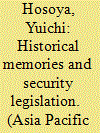

|
|
|
|
|
| Summary/Abstract |
In Japan, two political issues came to the forefront in the year marking the 70th anniversary of the end of World War II. While usually dealt with separately, the Statement by Prime Minister Shinzo Abe, issued on August 14, 2015, and the security legislation based on the concept of a “Proactive Contribution to Peace” both relate to the question of how we view Japan's place in international society. This article examines how both these issues support Japan's commitment to maintaining its identity as a peace-loving nation and its responsibility to contribute to international peace and prosperity.
|
|
|
|
|
|
|
|
|
|
|
|
|
|
|
|
| 5 |
ID:
128679
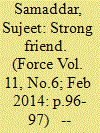

|
|
|